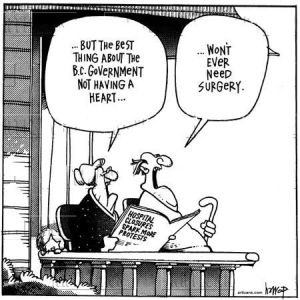 |
Much like support by women across the U.S. for the Bush administration, support among women for Gordon Campbell’s Liberals is all but absent.
According to an Ipsos-Reid poll conducted in March, only five percent of women “strongly approve” of Campbell’s performance as premier. Ten times more British Columbia women, 50 percent, “strongly disapprove” of the way the B.C. Liberal premier does his job.
In a cover story published in Vancouver’s alternative newspaper this week, Georgia Straight news editor Charlie Smith reports on the changes to the welfare system that have increased the health, social and other risks of, mostly female, single parents, and the increase in child apprehension that has followed; changes to employment standards that have had a disproportionately negative impact on women; a $12.7-million cut in child-care services that has all but eliminated funding for before-and after-school care for children in this province; deep cuts in programme funding for women’s services; and dramatic reductions in funding for a raft of other social programmes, including deep cuts to legal aid, and the virtual elimination of funding for school-based hot meal programmes.
In total, while introducing dramatic tax cuts for their rich friends — in the process eliminating some 50,000 goverment-related jobs to pay for the tax cuts (mostly affecting women, and the immigrant community) — the B.C. Liberals have cut $5 billion from the provincial budget, while making devastating cuts to programmes which have disproportionately affected women, aboriginals, children, seniors, the disabled, and the poor.
In 2003, a United Nations-sponsored coalition of women’s non-governmental organizations, The B.C. Committee on the Elimination of Discrimination Against Women (B.C. CEDAW), released a damning report (here available in pdf form) providing insight into “the wholesale withdrawal of programmes and protections” for women and children since the election of the Gordon Campbell lead Liberal government, on May 16, 2001.
Drastic and discriminatory changes to provincial legislation and programmes have been made since May 2001 … that have had an especially pernicious effect on women and girls who are most disadvantaged and most vulnerable. Specifically, elderly women, and women and girls who are Aboriginal, of colour, disabled, lesbian, recent immigrants or refugee claimants, living on low incomes, or living in rural areas experience the harms … in particular and intensified ways.
In an accompanying Georgia Straight article to this week’s cover story, titled “In Their Own Words”, contributing writer Gail Johnson not only provides information on cuts of $843 million from the three government Ministries with responsibilities for child care, children, women, and families: the Ministry of Community, Aboriginal and Women’s Services; the Ministry of Human Resources; and the Ministry of Children and Family Development, through the personal stories of women across this province, she reports on the real-life impact of the government cuts to programmes for women and girls of all ages, ethnicities, abilities, and economic circumstance.